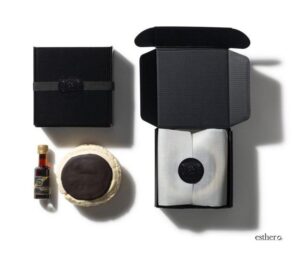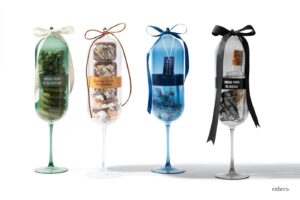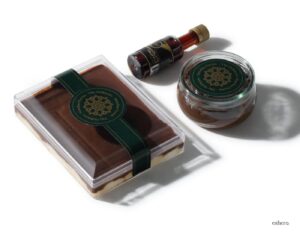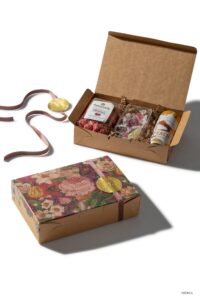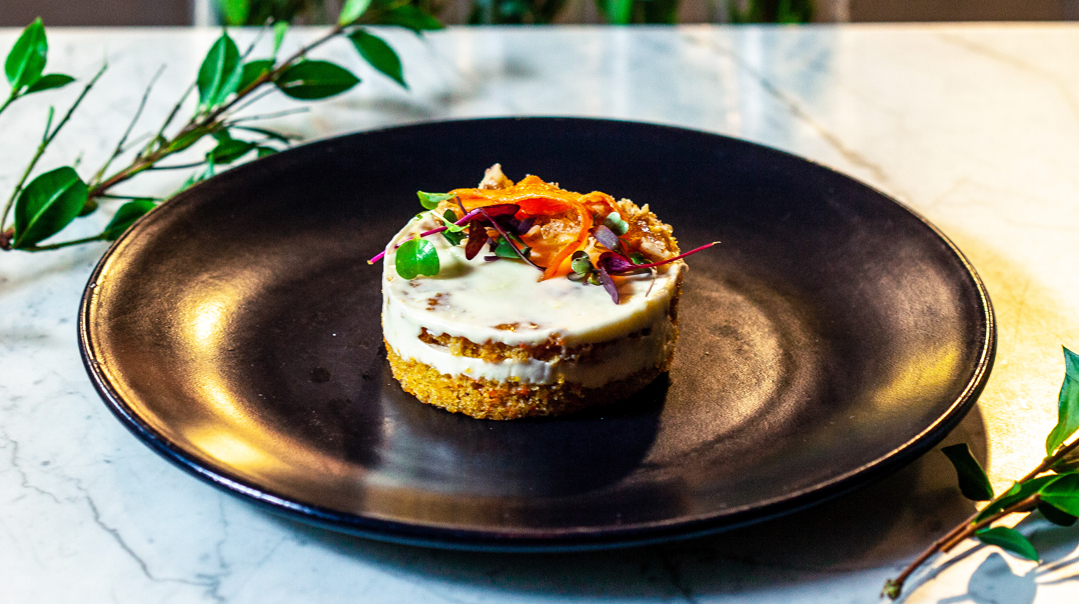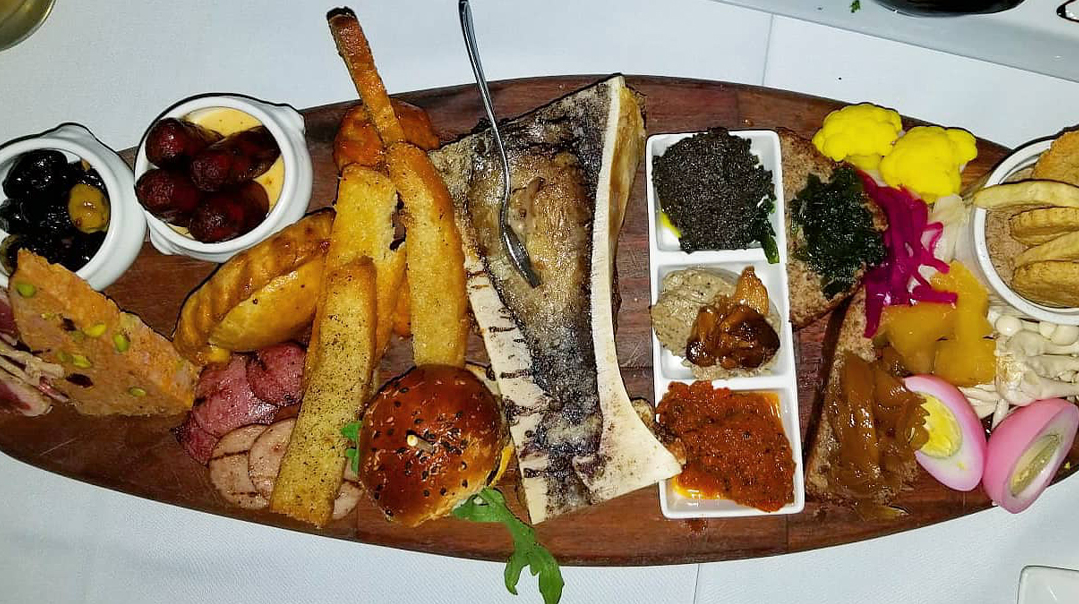Marani
| June 14, 2017
M ARANI GLATT KOSHER GEORGIAN RESTAURANT
97-26 63RD RD REGO PARK NY 11374
VAAD HARABONIM OF QUEENS
I don’t make it a habit of going to steakhouses all that often. There’s something that makes me feel a little guilty about ordering something I could have easily made in my own kitchen in a fraction of the time without hiring a babysitter. I guess that’s what draws me to Marani whose menu is definitely different from any other kosher restaurant I’ve been to in a really good way (in other words worth hiring a babysitter for!). Besides featuring the primarily herby complex flavors that are hallmarks of Georgian cuisine many dishes obviously take hours if not days to prepare slow-cooked or braised expertly in sauces that are somehow both decadent and light.
Marani is totally packed on a Sunday evening at seven thirty. Ana the owner laughs when I ask her if it’s always like this on Sundays. “We’re busy from two p.m. until the restaurant closes at ten ” she says. I’m surprised but she says families love coming in early for dinner with children. There are a number of tables with kids in the restaurant as she mentions it but somehow the overall vibe of the room is still sophisticated and adult. Maybe it’s the ceiling-high wine racks.
Ana is an absolute wellspring of information on Georgian culture and cuisine and it’s not just because I’m taking notes. She works the room every night greeting the many familiar faces and introducing herself to newcomers setting Marani apart in the packed kosher restaurant scene as one that is absolutely obsessed with customer service. And their service is nothing short of excellent. The waiter-to-diner ratio is very high and no one seems to be waiting for their food for very long. The servers are courteous and helpful a must when most of the items on the menu have five syllables.
Georgia is a country that lies between Eastern Europe and Western Asia and as such its food has influences from and similarities to many Ashkenazi Eastern European countries. While the flavors are definitely distinct to the country and region there’s an undercurrent of familiarity that is comforting so it’s different but not too different. We order some special Georgian sodas (surprisingly low calorie for a non-diet soda. I try to never drink my calories but pear-flavored Georgian soda gets me every time!) then start out with the adjapsandali a cold salad made with slow-cooked eggplants peppers tomatoes and herbs as well as some of Marani’s famous Georgian bread.
The long narrow loaf is fresh and fragrant and pairs perfectly with the adjapsandali. The salad is reminiscent of an excellent Israeli matbucha but the base is primarily eggplant. To me it tastes like eggplant the way that caramel tastes like white sugar: you know it’s there the flavor profile is in your head but the actual flavors are totally different. The method they use to slow-cook the vegetables results in a very rich and satisfying spreadable salad. I want to learn this and add it to my Shabbos dip rotation but Ana’s lips are sealed.
We also have the soko ketse mushroom caps baked with herbs and the Pelmeni small dumplings filled with ground beef and covered in saut?ed onions and tomatoes. The mushrooms are delicious and light and are a nice side dish or appetizer and the Pelmeni aren’t in any sauce which allows the dough to remain perfectly crisp and not soggy. They’re easily my husband’s favorite dish of the night and a perfect appetizer to share with a group.
Next we have what is most likely Marani’s signature dish adjaruli. Bread is molded into a sort of flakey soft bowl that holds a piping-hot mixture of chopped beef and mushrooms and is seasoned liberally with tarragon. The whole thing is baked fresh to order with a runny egg baked into it. You stir the yolk into the meat mushroom filling yourself and mix it all together so that each bite gets a little of everything. The tarragon flavors are definitely at the forefront of this dish but it balances very smoothly with the mushrooms meat and egg until it’s all one homogenous dish. Even if you think you don’t like tarragon this dish might very well change your mind. No matter how many times we come back to Marani to try their seasonal dishes (about 30 percent of the menu changes several times a year) we always get the adjaruli.
Afterward we try a dark chicken kebab which seemed very straightforward and nondescript. Ana tells us that people come from all over just for the kebabs. “It’s crazy. We have all this food that’s different and exciting and people still love the kebabs!”
I take a bite and it’s clear why. The flavors of the marinade permeate every bite of chicken. It’s cooked absolutely perfectly and is so tender and moist that it absolutely melts in your mouth. I know that phrase is overused but I can’t think of a better way to describe it. And at only $6 for a chicken thigh kebab it’s an excellent deal too.
Next we have the lamb chops which come on a huge platter and include fries (we choose sweet potato and pretend we took the healthy way out) and a side of sautéed mushrooms and spinach. All the portion sizes are extremely generous and the lamb is cooked perfectly and very tender. It’s served with ketchup and a homemade tomato-based sauce that complements the meat well.
Ana noticing our menu choices is concerned that we haven’t had enough authentically Georgian food so she sends over an order of khinkali — Georgian-style soup dumplings stuffed with beef lamb and herbs. They seem to be extremely popular as well and Ana tells us that she has one full-time cook working just on the Pelmeni and the khinkali — he makes large soup dumplings and small appetizer dumplings all day long. The dough is pleated and pinched and gathered in the center of the dumpling.
She comes over as it’s being served to give us instructions: after a quick grind of pepper you pick up the dumpling by the large fold of dough in the center turn it upside down and take a small bite out of the side. It’s filled with soup so you drink the soup out the dumpling and then eat the ground meat filling. “No forks and knives for this ” she warns. She also instructs us not to eat the pinched dough.
“In Georgia the men are very macho ” she explains with a grin. They sit around and drink and eat khinkali and use the leftover dough as a convenient marker to compare who ate more. At this point in the meal our khinkali count is nothing to brag about but the size of our leftovers bag is growing impressively.
At last we finish and Ana graciously sends over some of her signature desserts. Marani’s pareve napoleon is of the best I’ve ever tasted. The homemade puff pastry is extremely light and airy holding its texture very well. Unlike store-bought frozen puff pastry it leaves no oily residue in your mouth or on the plate. The pastry cream is light and not too sweet and complements the dough perfectly.
We’re also served pastry cigarettes which are filled with cinnamon and nut paste. Homey and delicious they remind me of the nut cakes my great-grandmother used to make. I’m certain that they’re fried since they’re so evenly crispy on the outside but Ana assures us that they’re actually baked.
Marani has not disappointed. By the time we’re ready to go it’s close to closing time but half the restaurant is still full. We pass a date a family with four kids and what looks like a business meeting on our way out and I have to say they all look as satisfied as we are. (Originally featured in Family First Issue 546)
Oops! We could not locate your form.

